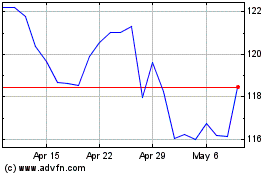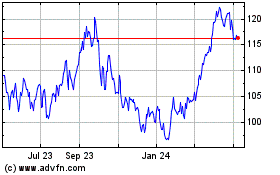(FROM THE WALL STREET JOURNAL 11/16/15)
By Sarah Kent
The world's biggest energy companies have doubled down on their
promise to protect dividends, despite a precipitous drop in profits
this year, driven by a steep decline in oil prices.
In the first nine months of the year, the four oil companies
known as the supermajors -- Royal Dutch Shell PLC, Exxon Mobil
Corp., Chevron Corp. and BP PLC -- have seen their collective
earnings fall by more than 70% from a year earlier. Over the same
period, they have handed out nearly $28 billion to their
shareholders, a roughly 10% increase from the 2014 period.
"The dividends and payouts to shareholders have no reason to be
as volatile as the oil price," said Patrick Pouyanne, chief
executive of France's Total SA, the world's fourth-largest oil
company by production, at a conference in Abu Dhabi this week.
He added that it would be a "terrible mistake" to remove
dividends and a sign that "we aren't good at our business."
Oil prices are currently trading slightly above $40 a barrel --
their lowest levels since August -- and more investment banks,
energy companies and analysts don't see the price rising above $60
a barrel until 2017. The International Energy Agency said Tuesday
oil prices would slowly rise to $80 a barrel by 2020, but also
outlined a scenario in which they stayed at $50 a barrel.
This has raised questions on a potential cash crunch at oil
companies, a problem the firms acknowledge and say they are taking
steps to address. The companies say they retain robust balance
sheets that give them flexibility to raise more funds to help cover
costs when needed.
Oil majors have little choice but to pay fat dividends to keep
investors. Most of these companies don't offer investors compelling
growth prospects as they struggle to replace even the millions of
barrels of oil pumped every year. Fat dividends are a
crowd-pleasing but potentially risky strategy given concerns about
the length of the current price downturn and its impact on cash
flow.
"Dividends are extremely important. Certainly a lot of the
holders of companies like Royal Dutch and BP are expecting these
dividends to be paid," said Richard Marwood, fund manager at AXA
Investment Partners, which holds energy stocks. Any reduction in
dividend would "probably see quite a shocked reaction in the share
price," Mr. Marwood said.
This strategy also may not be sustainable if oil prices, which
are in the midst of their worst slump since the 1980s, continue to
slide. The dividend yields -- the value of shareholder payouts as a
percentage of the share price -- oil companies made last quarter
are at the highest level in more than a decade, according to data
from FactSet.
An investor who owns 1,000 shares of Shell would have made
$1,410 in dividend so far this year, which is a yield of nearly 6%
per share based on Friday's closing stock price.
Investors have come to rely on these firms making such regular
payouts. Chevron has increased its annual per-share dividend for
each of the last 28 years. Exxon has increased its dividend by an
average of 6.4% every year for the last 33 years, and is the only
major to maintain a share-buyback program. Shell and BP have
reiterated that maintaining returns to shareholders is a
priority.
These payments to investors come amid $22 billion in slashed
spending on exploration and development of oil fields, and 80
scrapped or delayed projects so far this year, according to Lamar
McKay, BP's head of exploration and production. More cuts are
expected next year if prices don't pick up significantly.
"In essence the dividend yield isn't something that drives
value. . .we do think management of these companies should try to
spend time trying to create value for the business rather than
trying to attract shareholders with promises of stable and growing
dividends," said Martijn Olthoff, a senior portfolio manager at
Dutch pension-fund manager APG Asset Management NV, which owns
shares in these oil majors.
Some companies also have offered shareholders the option to
receive payment in shares instead of cash, and have divestment
programs that can bolster cash flow.
Exxon said last month that it has generated $7.4 billion in free
cash flow this year. Shell said it has covered its capital spending
and shareholder payouts over the past year from cash and asset
divestments.
BP laid out plans to cover its spending with cash by 2017 even
at $60 a barrel and Chevron has also promised it will meet dividend
payments from cash flow in 2017.
Oil companies also have put a laser focus on value. BP has said
that 80% of the new projects it is considering break even below $60
a barrel and that number is expected to move lower in line with
cost deflation.
Shell is looking at new projects that can make money at around
$55 a barrel. The company has only approved two major new projects
this year and has scrapped big-ticket projects in Alaska and
Canada.
"This is all about making sure we can continue paying dividends
to our shareholders," said CEO Ben van Beurden.
Edinburgh-based consultancy Wood Mackenzie said this month that
longer-term growth prospects are already starting to suffer from
lower investment. Last month, Chevron lowered its production target
for 2017 by 100,000 to 200,000 barrels a day, following a similar
move by French oil major Total SA in September.
Among big oil companies, only Italian giant Eni SpA has taken
the step of actually cutting its dividend, slashing the amount of
cash it returns to investors by nearly 30% in 2015 compared with
last year.
Eni Chief Executive Claudio Descalzi has said oil companies must
live within their means, but it is a move his competitors haven't
followed.
After Chevron reported its profits fell 60% in the third quarter
from a year earlier, the company's Chief Executive John Watson,
said: "Our first priority is to maintain the dividend and grow it
as the pattern of earnings and cash flow permit."
Access Investor Kit for "BP plc"
Visit
http://www.companyspotlight.com/partner?cp_code=P479&isin=GB0007980591
Access Investor Kit for "Royal Dutch Shell PLC"
Visit
http://www.companyspotlight.com/partner?cp_code=P479&isin=GB00B03MLX29
Access Investor Kit for "Royal Dutch Shell PLC"
Visit
http://www.companyspotlight.com/partner?cp_code=P479&isin=GB00B03MM408
Access Investor Kit for "BP plc"
Visit
http://www.companyspotlight.com/partner?cp_code=P479&isin=US0556221044
Access Investor Kit for "EXXON MOBIL CORP"
Visit
http://www.companyspotlight.com/partner?cp_code=P479&isin=US30231G1022
Access Investor Kit for "Royal Dutch Shell PLC"
Visit
http://www.companyspotlight.com/partner?cp_code=P479&isin=US7802591070
Access Investor Kit for "Royal Dutch Shell PLC"
Visit
http://www.companyspotlight.com/partner?cp_code=P479&isin=US7802592060
Subscribe to WSJ: http://online.wsj.com?mod=djnwires
(END) Dow Jones Newswires
November 16, 2015 02:47 ET (07:47 GMT)
Copyright (c) 2015 Dow Jones & Company, Inc.
Exxon Mobil (NYSE:XOM)
Historical Stock Chart
From Mar 2024 to Apr 2024

Exxon Mobil (NYSE:XOM)
Historical Stock Chart
From Apr 2023 to Apr 2024
